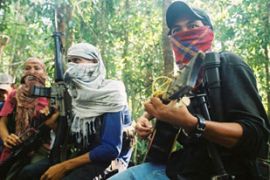Philippine ‘rebel leader’ arrested
Comrades vow attacks after Dutch police arrest alleged communist chief in exile.

Published On 29 Aug 2007
The 68-year-old is accused of the killings in 2003 and 2004 of Romulo Kintanar and Arturo Tabara, two former allies, prosecutors said, and is due to appear in a Hague court on Friday.
The New People’s Army claimed responsibility for the slayings in Quezon city in the Philippines.
Wim de Bruin, a spokesman for the prosecutor’s office, said Sison would be tried in the Netherlands, not the Philippines.
“There is no extradition request,” De Bruin said. “These are crimes that were committed in the Netherlands. Ordering murders is a crime according to Dutch law.”
Philippine reaction
Gloria Arroyo, the Philippine president, hailed the arrest as “a giant step toward peace. A victory for justice and the rule of law”.
But the National Democratic Front (NDF), a Philippine Marxist umbrella group based in the Netherlands, condemned the arrest.
“Contrary to the claims of Mrs Arroyo, the arrest of Professor Sison and the raids conducted are bound to terminate the ongoing peace negotiations,” Fidel Agcaoili, an NDF official, said.
Luis Jalandoni, NDF’s chairman, said protests were planned on Wednesday in Manila and Philippine communities in six countries.
“Certainly, the struggle of the people in the countryside and cities will intensify,” Jalandoni told Philippine radio station DZBB in an interview from the Netherlands.
Jesus Dureza, Arroyo’s adviser on the peace process, said: “I’m sure the security forces are taking the appropriate measures.”
Stalled talks
Sison has denied any operational role with the rebels since leaving the Philippines in 1986, and calls himself a political consultant for NDF, which has been involved in peace negotiations for many years with Manila.
The talks have stalled since 2004 and the rebels have continued to carry out attacks, mostly on security forces and infrastructure.
Sison has fought a legal battle to stay in the Netherlands as a refugee, saying he faced assassination if he were to return to the Philippines.
The Dutch government has repeatedly rejected all his requests for asylum but has never moved to expel him.
The European Union added Sison and the New People’s Army to its list of “terrorists” in October 2002.
Source: News Agencies